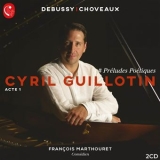Cyril Guillotin ist einer jener Pianisten, bei denen man immer den Eindruck hat, etwas Unmittelbares zu erleben, weil er uns in seine Aura zieht und das Geheimnis, das große Mysterium Musik mit uns teilt.
Die Interpretationen von Debussys Préludes lassen sich in mehrere Kategorien einteilen: Es gibt die Kategorie der reinen Impressionisten, die im Allgemeinen sehr intellektuell sind, und es gibt die der Pianisten, die Bilder evozieren. Guillotin hat den Vorteil, Eindrücke, Atmosphären und Bilder zu kombinieren, mal klarer definiert, mal diffuser. In diesen Aufnahmen mit Werken von Debussy und Françoise Choveaux (*1953) sind es aber vor allem die sehr persönliche Spontaneität und die Ausdrucksfülle, von denen eine phänomenale Energie ausgeht. Klarheit der Phrasierung, perfekte Dosierung der Eleganz, virile Klangfülle: Guillotin spricht zu uns und spricht gerne zu uns. Bei ihm kommt die ganze Magie von Debussys Musik zum Tragen
Er erkundet die Klangwelt der Préludes mit einem ständigen Bemühen um Farbe und Reichtum der Harmonien. Er schafft so eine stets eindrucksvolle Atmosphäre. Dasselbe gilt für die evokativen Préludes von Françoise Choveaux.
Die zweite CD enthält neben den Debussy-Préludes dazu passende Gedichte von Autoren wie Hugo, Verlaine, Valéry, Gautier, Baudelaire u.a. Die Idee, manchmal den Text mit der Musik zu mischen ist problematisch, weil die wenig konturierte und nicht klar artikulierende Stimme des Erzählers François Marthouret dann nicht immer verständlich ist.
Cyril Guillotin is one of those pianists with whom one always has the impression of experiencing something immediate, because he draws us into his aura and shares with us the great mystery of music.
The interpretations of Debussy’s Préludes can be divided into several categories: There is the category of pure impressionists, who are generally very intellectual, and there is that of pianists who evoke images. Guillotin has the advantage of combining impressions, atmospheres and images, sometimes more clearly defined, sometimes more diffuse. But in these recordings of works by Debussy and Françoise Choveaux (b. 1953), it is above all the very personal spontaneity and expressiveness from which a phenomenal energy emanates. Clarity of phrasing, perfect dosage of elegance, virile sonority: Guillotin speaks to us and likes to speak to us. With him, all the magic of Debussy’s music comes to fruition
He explores the sound world of the Préludes with a constant concern for color and richness of harmonies. He thus creates an atmosphere that is always impressive. The same is true of Françoise Choveaux’s evocative Préludes.
The second CD contains, in addition to the Debussy Préludes, matching poems by authors such as Hugo, Verlaine, Valéry, Gautier, Baudelaire, etc. The idea of sometimes mixing the text with the music is problematic because the narrator François Marthouret’s poorly contoured and not clearly articulated voice is then not always understandable.
























